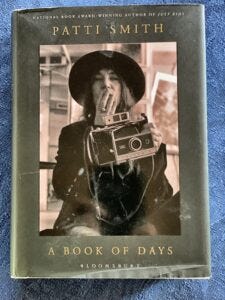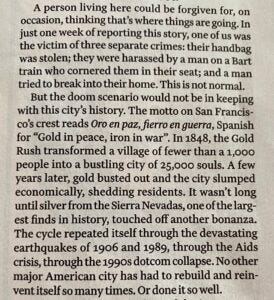Thursday 25 May, 2023
Books to infinity
A corridor in my favourite library.
Quote of the Day
”He once remarked that he would sell his grandmother for a finely turned phrase, and if I were his grandmother I would have taken this comment seriously enough to go into hiding.”
Terry Eagleton on Martin Amis
Musical alternative to the morning’s radio news
Haydn | Trumpet Concerto | Tarkövi · Minkowski | Karajan-Academy of the Berliner Philharmoniker
Long Read of the Day
The One Best Way Is a Trap
Interesting and thoughtful essay by L.M. Sacacas on how technology’s relentless quest for optimisation is inhumane.
The 20th century French polymath, Jacques Ellul, wrote around 50 books, but he is best remembered for The Technological Society.1 And this fat book, stuffed with countless examples, basically conveys a single overarching idea: modern society is ordered by one master principle, which Ellul, in French, called la technique.
The standard definition of technique from Ellul goes like this: “Technique is the totality of methods, rationally arrived at and having absolute efficiency (for a given stage of development) in every field of human activity.”
That may not be the most elegant or memorable formulation. Lately, I’ve been summing up Ellul’s technique by describing it as the relentless drive to optimize all human experience for efficiency.
But Ellul also helped us out with another more felicitous phrasing. He referred to technique as the search for the “one best way.”
Later on, Sacasas writes,
Perhaps it is simply the case that a society ordered by technique, by the relentless pursuit of optimization, by a compulsive search for the “one best way,” necessarily yields a mental health crisis by generating unattainable goals and unsustainable pressures to, quite literally, measure up.
btw: The best contemporary articulation of the ‘optimisation’ thesis that I’ve found is System Error: where biog tech went wrong and how we can reboot by Weinstein, Reich and Sahami.
Books, etc.
I’ve written about this before but came on it the other day when I was looking for something else. It’s one of the nicest books I own — a diary of a year with a photograph a day accompanied by a thought, an aphorism or a memory. It’s truly beautiful work by a great artist.
Feedback
Keith Devlin (Whom God Preserve) was moved by my reference to the FT’s account of the decline of San Francisco to write:
Reports of San Francisco’s death are greatly exaggerated, as Mark Twain would have said. Post-Trump and post-pandemic (mostly the latter), that FT doom-fiction (lacking only a heavily armed Charlton Heston careering around in a jeep) could describe pretty well any large US city these days, and on a smaller scale even small towns like our nearest Petaluma. Meanwhile, I don’t see any gloom among those of us who live in this region; just an acceptance that recovery from a global pandemic takes at least five years, and likely a whole lot longer given the way the world economy operates these days. But if those stories keep out the racist hoards from the Red states, I think we’ll all be thankful. :)
I hold no brief for the FT team who produced the report, but they do end on a more judicious note, viz
Fighting the Law
I should have known that my half-assed attempt at tracing the origins of a popular song would come unstuck.
Re I Fought the Law, Jonathan Holland writes:
Credit where credit’s due: despite your link, it was Sonny Curtis and not Buddy Holly who wrote and sang “I Fought the Law” with The Crickets, following Holly’s untimely death:
I once played an adapted version of it as a sendoff for a retiring faculty colleague, under the somewhat less rebellious title of “I Taught the Law”.
And then came the news that the Bobby Fuller Four had also recorded it — accompanied by a Link proving that this was indeed the case.
Garth Cartwright added some supporting detail:
as a music geek I’d like to note that while The Crickets first cut I Fought The Law it was Sonny Curtis – Buddy’s replacement – who wrote the tune and sang it. Then it was Bobby Fuller, the doomer Texan rocker, who made it a hit.






